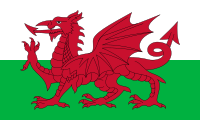|
Islam in Wales

Islam in Wales (Welsh: Islam yng Nghymru, Arabic: الإسلام في ويلز) is a minority faith followed by 2.1% of the population of Wales, making Islam the second most practiced religion in the country after Christianity. Wales is also home to the oldest Muslim communities in the British Isles, established during the early nineteenth century by Muslim seafarers in the industrial ports of South Wales. HistoryEarly historyRecords of contact between Wales and the Muslim world dates back to the early 12th Century. Wales has been home to a Muslim population since at least the mid 1800s when Muslim workers, especially Somali and Yemeni seafarers settled in the new Welsh ports, most notably in the Butetown area of Cardiff.[1][2] The first purpose built mosque in Wales, the Peel Street Mosque was completed in 1947 in Cardiff. The original structure was a traditional domed structure with minarets, but was redeveloped in 1988 as a brick building.[3] In the 21st centuryThree Mosques converted from former Welsh dissenter chapels. Bilal Mosque, Cardiff, Shah Jalal Mosque in Canton, Cardiff and Swansea Mosque. New Muslim Network Wales was established in the later part of 2001 to provide support and advice to converts to Islam and their non-Muslim family. The group also provides advice to mosques and other Islamic organisations on dawah work and community relations.[citation needed] In 2003, the Muslim Council of Wales was established with affiliates across Wales to represent the Muslim community in the public sphere. In 2006, the first scout group for Muslims was launched in Cardiff with over 100 members.[4] The first university in the UK to be awarded by FOSIS (Federation of Students Islamic Societies, UK & Éire) for the best mosque facility on campus was a Welsh University – Swansea, which received the accolade in 2007. In 2008, plans were announced to build an Islamic Centre in Carmarthen.[5] A college for training Muslim clerics has been established in Llanybydder in Carmarthenshire.[6] In the 2010s[when?] , the Ahmadiyya Muslim Community has announced plans to construct the first Ahmadi mosque in Wales.[citation needed] Demography
The 2021 United Kingdom census recorded around 64,000 Welsh Muslims, up around 50% from the 46,000 adherents recorded in the 2011 Census. More than half of all Welsh Muslims (33,650) live in Cardiff.[7][8] Newport and Swansea are the second and third largest centers of Islam in Wales after Cardiff, with 11,280 Muslims in Newport and 7,694 in Swansea according to the 2021 Census. As such more than 80% of all Welsh Muslims live in the three largest cities. Outside of these cities, Wrexham is home to the largest Muslim population (1,540), but almost all other areas of Wales are home to a small but increasing Muslim population, with only Ceredigion and Gwynedd reporting a drop in adherents in the 2021 Census.[9] Of the 57 mosques in Wales, most are to be found in Cardiff, with seven in Newport,[10] and four in Swansea.[11] There are also Mosques in most large towns across the nation such as those at Aberystwyth, Bangor, Barry, Haverfordwest, Lampeter, Neath, Port Talbot and Wrexham.[12] Bibliography
See alsoReferences
External linksWikimedia Commons has media related to Islam in Wales.
|




